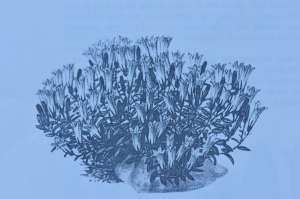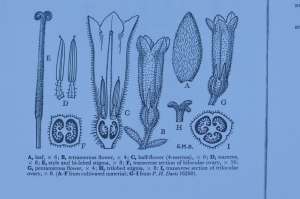myrtifolia
Campanula myrtifolia
Boiss. & Heldr. (1849), synonym Trachelium myrtifolium (Boiss. & Heldr.) Boiss., synonym Tracheliopsis myrtifolia (Boiss. & Heldr.) Schwarz & Davis in Hook. Discovered in 1845 by Heldreich and described by Boissier.
Habitus
Dwarf, caespitose, fragile, suffruticose perennial herb; caudiculi branched, nodulose; stems numerous, erect, 1.5-3(-4)cm., (including inflorescence), fragile, hispidulous.
Leaves
Leaves minute, sessile, elliptic to broadly ovate-elliptic, firm, 2-6mm. long, 1-4mm. broad, antrosely strigulose on surfaces and margin.
Flowers
Flowers small, 5- or sometimes 4-merous, solitary or in a 2-5-flowered corymb, borne on filiform bracteolate pedicels. Sepals exauriculate, linear-lanceolate, 2-2.8mm. long, strigulose, 1-11/2 times as long as the suborbicular, hispidulous ovary. Corolla lavender-blue or sometimes white, narrowly tubular-infundibular, 7-8mm. long, including the triangular 1mm. scarcely divergent lobes, softly hispidulous outside. Filaments linear-lanceolate, 0-8mm., ciliolate; anthers linear, 2mm. long, ending in a swollen-tipped mucro. Style included, c. 6mm. long, papillose; stigmas 3(-2), recurved, 0-3mm. long.
Fruit
Capsule 2.5-3mm. long, opening by 3 basal 0.8-1mm. pores. Seeds not available.
Living
In crevices of sloping and vertical limestone rocks between 1070 and 2100 m.s.m.
Origin
Central part of the Isaurian Taurus (provinces of Konya and Icel, north and south of the Goksu valley near Ermenek) mountains of southern Turkey.
Cultivation
Seed of Campanula myrtifolia was brought back by the writer in 1949, and plants raised at Enfield by the late G.H. Berry. The plant figured was grown in N. London by Mrs. Margaret Earle (Mr Berry’s daughter) where it has flourished in pots in an unheated alpine house. It is said to be completely cold-hardy, flowers vigorously, and can be propagated by seed and cuttings 1).
Foto: Campanula myrtifolia = N.s.t. 637, Bot.Mag. 179:1972; Margaret Stones del-P.H. Davis Foto bloemdelen: Campanula myrtifolia = N.s.t. 637, Bot.Mag. 179:1972; P.H. Davis.


